Elagabalus was a Roman emperor of the early third century who has not gone down in history with a good reputation. Kovalyov describes it as “corrupt to the extreme” and “sexual pervert” , while Gibbon says "that he gave himself over to grosser pleasures and uncontrolled fury" . Nor did his contemporaries leave a positive portrait:nor Dio Cassius in his Roman History neither Herodion in his work with the same title nor the anonymous authors of the Augusta History , although then the political positions of historians always left a shadow of doubt.
The truth is that Vario Avito Basiano, which was his real name, although when he ascended the throne he changed it to Marco Aurelio Antonino Augusto (Heliogabalus was a nickname), he did not have easy times. The 3rd century AD It was the crisis of the empire par excellence, both economically and politically. Since the death of Marcus Aurelius, first a character of the likes of Commodus and then a senator as rigid as he was ephemeral, Pertinax, had succeeded one another in power, leading to the embarrassing auction of the crown that the Praetorians organized in the year 193 and that Julian was the highest bidder... but at the same time the border legions proclaimed three emperors simultaneously:Albinus in Britannia, Nigro in Syria and Septimius Severus in Illyria and Pannonia.
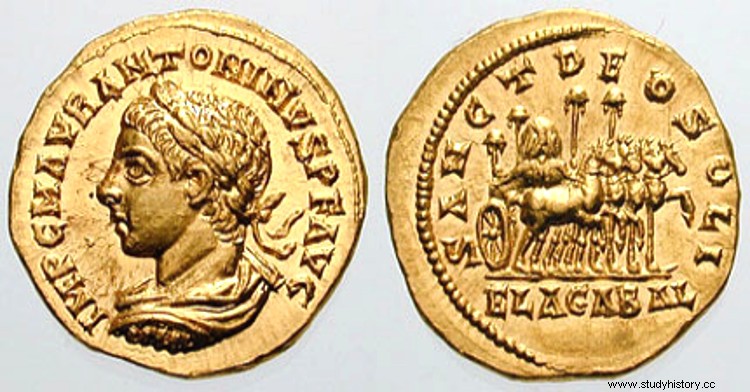
In the end, it was the latter who prevailed after defeating the others one after another and gaining a foothold in the position following two guidelines:using an iron fist against any opponent and the pragmatic advice he gave his children before he died: "Make the soldiers rich and don't worry about the rest." Severo, who inaugurated a dynasty, managed to partially mend the crisis with a series of administrative reforms, but at the cost of ending what little authority the Senate had left and turning his regime into a de facto military dictatorship .
In any case, the seams eventually gave way and, behind him, his son Marcus Aurelius Severus Antoninus Augustus, alias Caracalla (because of the Gallic cape he wore), plunged Rome into chaos with the repression of thousands of supporters of his brother Geta. -the one he had murdered- and the granting of citizenship to all the inhabitants of the empire to unite it and get more taxes. Only he also wanted to emulate Alexander and got into a disastrous war against the Parthians that led to his death at the hands of the praetorian prefect Macrinus, who, of course, proclaimed himself emperor. It did not last long, a couple of years, because he had to buy peace from the Parthians and for this he was forced to lower the salaries of the military who, neither short nor lazy, set their sights on a new Severo candidate:the nephew of Caracalla, Basiano.
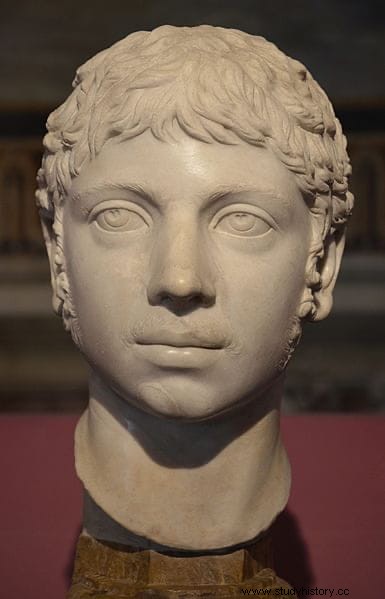
Basiano, today better known as Elagabalus, had that nickname because he was high priest of El-Gabal (in Latin Elagabalus), a Syrian divinity whose cult originated in the city of Emesa. Perhaps it was a derivation of that Moloch Baal of the previous millennium, in turn from the Canaanite Baal, which was worshiped in Syria and Phoenicia and which the Romans assimilated to Saturn. However, etymologically it meant God of the mountain .
In any case, Basiano was born in the same Emesa around the year 203, the son of Senator Sextus Vario Marcelo and Julia Soemias Basiana, niece of Septimius Severus and cousin of Caracalla. Fleeing from Macrino, the family had gone into exile in that province, from where they conspired against him by spreading the hoax that little Basiano was the secret son of Caracalla to reinforce his aspiration to the throne.

Between that and the money that grandmother Julia Mesa distributed among the men of the Third Legion, they got the support of the latter and in May of the year 218 that adolescent who until then had dedicated himself only to religious work was proclaimed emperor. Fed up with Macrinus, other legions went over to the opposite side and, after a defeat at Antioch and a grotesque attempt to escape in disguise, the emperor was executed, as was his son. The Severans returned to Rome.
Elagabalus assumed power without wanting to give up his priestly function. At that time, both in the regions of the empire and in the Italian peninsula itself, oriental cults had spread that broadened the religious panorama, creating a syncretism that, around the same time, would also allow Christianity to spread.
But the abrupt irruption of the faith of the new emperor did not sit well in the capital; the Senate was annoyed with the order to place effigies of the president portrayed as Elagabalus and, worse still, with the one to attend the rites in his honor; but he had to agree because of his diminishing situation.
However, the displeasure of the military was more evident and there were already attempts at insurrection from the beginning, although they were crushed. Thus, the will of Heliogabalus was imposed, who, not content with honoring his god at the solstices by assimilating him to the Unconquered Sun (the same one from which Christmas would emerge), placed him at the head of the pantheon above Jupiter, marrying him with Minerva ( apart from his wife Astarte) and taking advantage of the unfinished foundations of a temple to Jupiter begun by Domitian on the Palatine Hill to build one for El-Gabal.
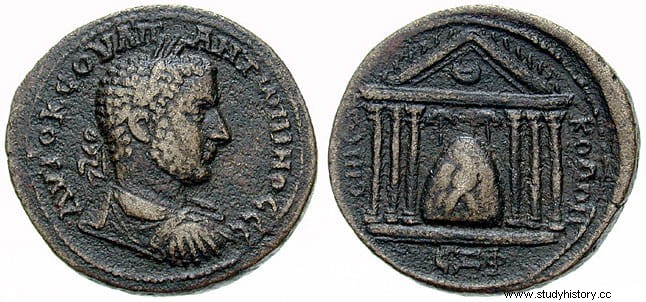
The Elagabalium, as it was baptized, had a rectangular floor plan, seventy by forty meters, and the figure of the god was represented by a conical black stone that some believe came from a meteorite. There the emperor deposited the sacred relics that he had brought from Emesa; moreover, he also transferred those of the other Roman divinities, which greatly irritated the whole society.
Of course, that might not have been a major problem were it not for two other factors. In the first place, the distribution of outstanding positions that the family reserved for friends and relatives. And secondly, the personal behavior of Elagabalus and his circle of courtiers:although he was married five times, it seems that he was homosexual and his charioteer (a Carian slave named Hierocles whom he used to describe as a husband) was among his most intimate emotional relationships. and a smyrion with whom, according to the Augusta History , he publicly held a wedding ceremony.
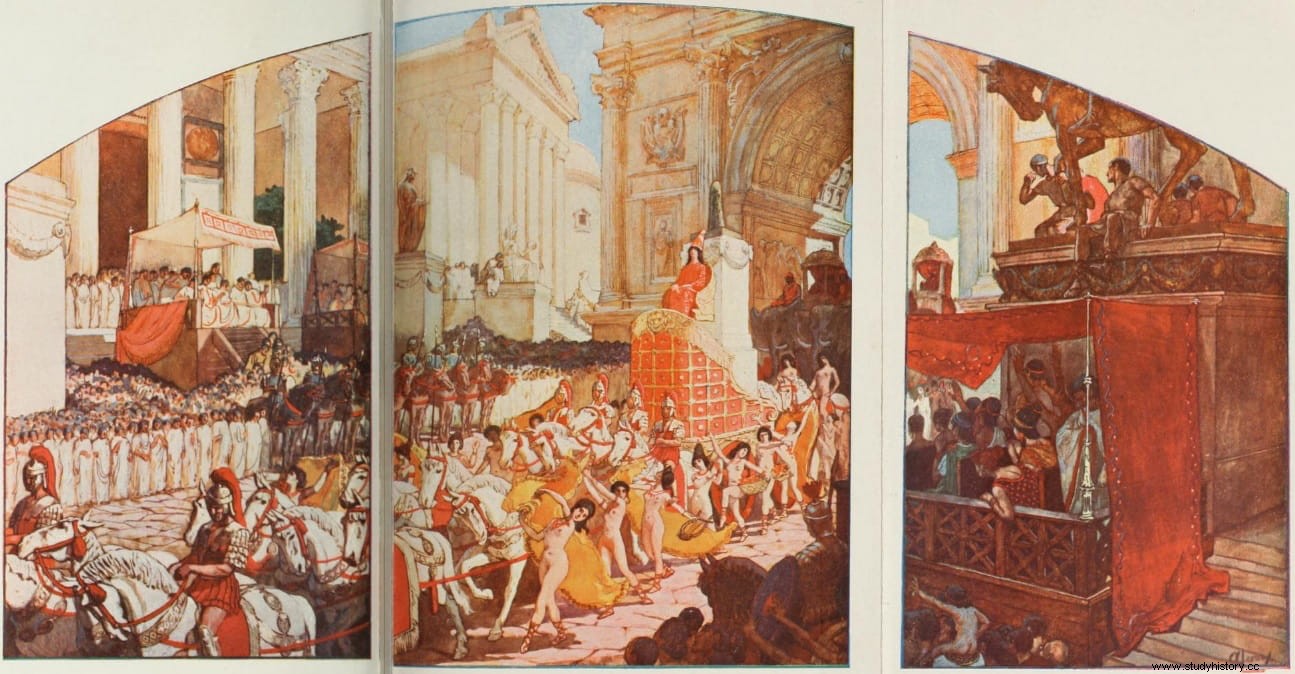
Cassius Dio adds that the emperor groomed himself like women (waxing, makeup, wearing wigs), that he even prostituted himself (in taverns and in the palace itself) and that he offered great wealth to the doctor who knew how to replace his male genitalia with female ones. .
If this is true, he would probably be a transsexual today but in ancient times it was only considered depravity and all these eccentricities culminated in his declared intention to name Hierocles Caesar, thus associating him with the throne and making him his successor. The scandal reached such a magnitude that his own grandmother understood that he was endangering the dynasty and had to be removed, convincing him to forget about the slave and instead appoint his cousin Alexander Severus as Caesar.
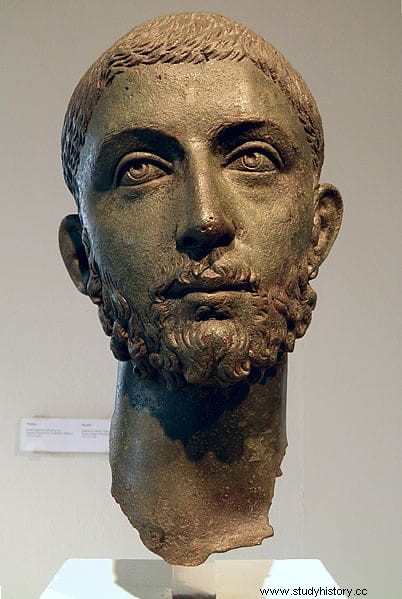
Heliogábalo accepted in the first instance but then found that Alexander was the favorite of the Praetorians and revoked everything granted. It was the straw that broke the camel's back:in the year 222 the Praetorians mutinied, assassinating the emperor and his mother (they died together, embracing each other); they were then beheaded and their naked bodies dragged through the streets before being thrown into the Tiber. As expected, Hierocles met the same fate and with him other members of the court. Alexander came to the throne but, weak-willed and only thirteen years old, the effective government was his grandmother first and his mother after him.
During his rule, everything arranged by Elagabalus was eliminated, to whom the corresponding damnatio memoriae was applied.; The entrance of women to the Senate was also prohibited, which recovered -briefly- part of its prerogatives and proceeded to demilitarize political life to restore the "true" Roman principles. As for the religious question, Elagabalus was proscribed and his Palatine temple was demolished, restoring it later to Jupiter; After all, it was a hated place, not only for its almost blasphemous character but also because, according to the improbable legend, Elagabalus presided over human sacrifices of patrician children there.
